人教版九年级全册Unit 4 I used to be afraid of the dark.Section A (Grammar--4c)课件(共22张PPT)
文档属性
| 名称 | 人教版九年级全册Unit 4 I used to be afraid of the dark.Section A (Grammar--4c)课件(共22张PPT) | 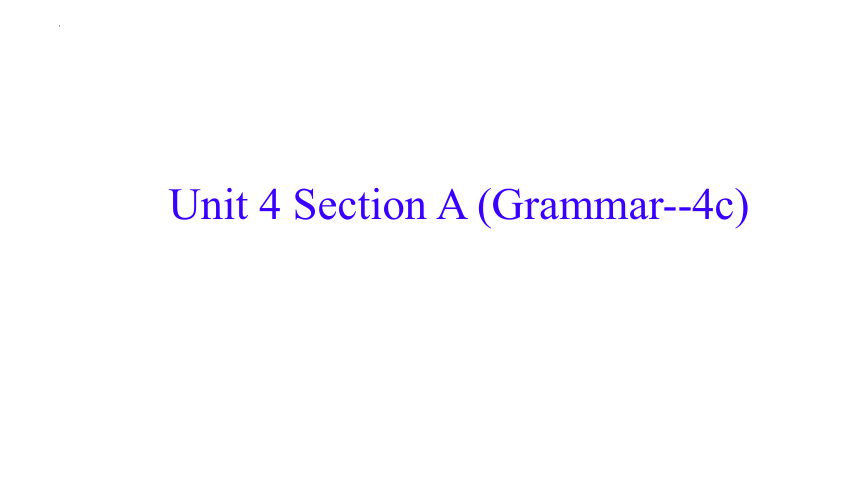 | |
| 格式 | pptx | ||
| 文件大小 | 20.4MB | ||
| 资源类型 | 教案 | ||
| 版本资源 | 人教新目标(Go for it)版 | ||
| 科目 | 英语 | ||
| 更新时间 | 2024-09-29 18:09:37 | ||
图片预览

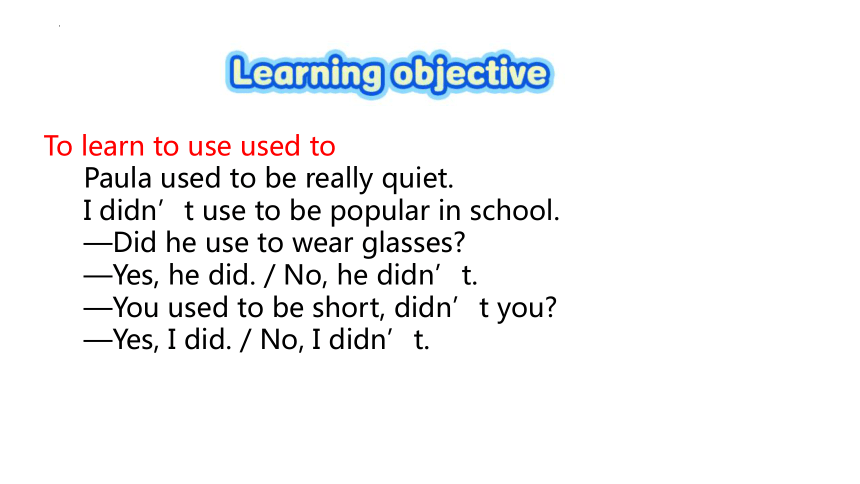
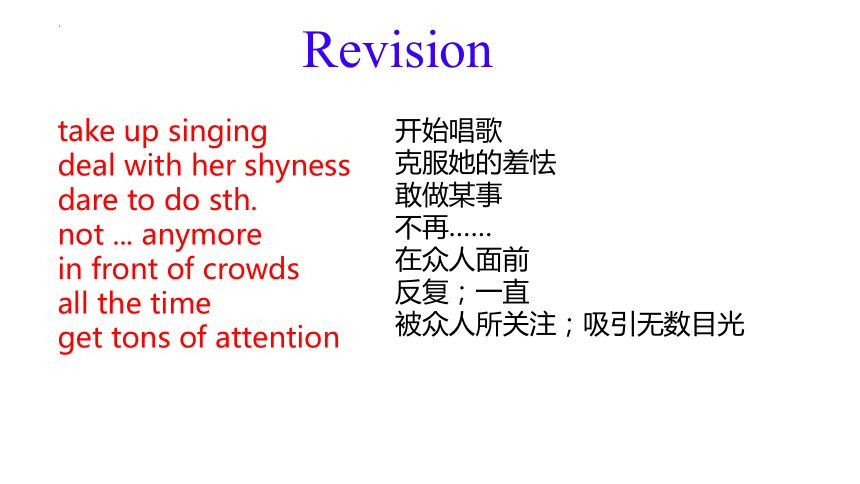
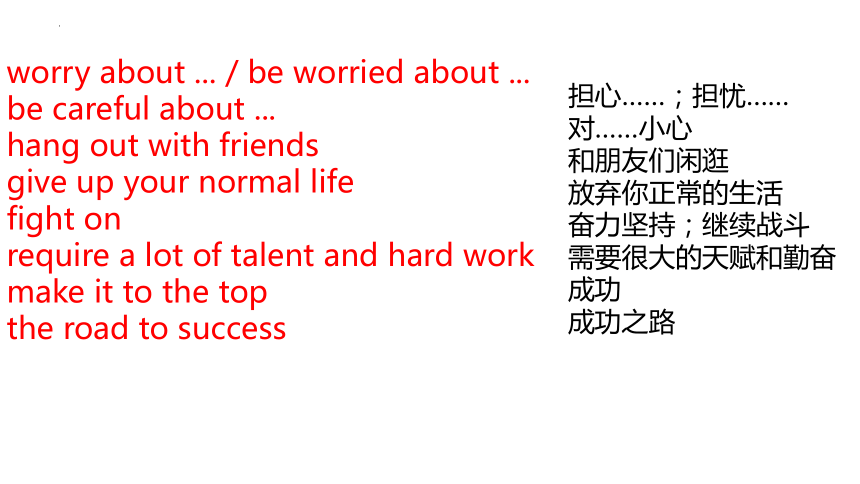
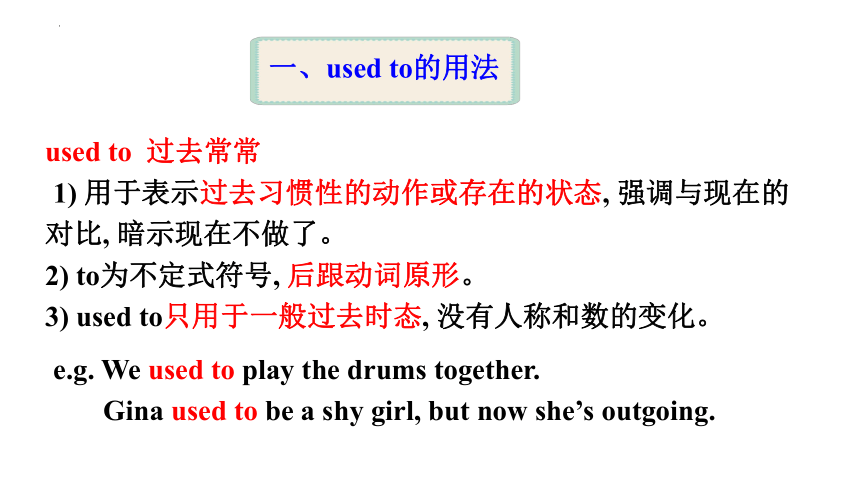
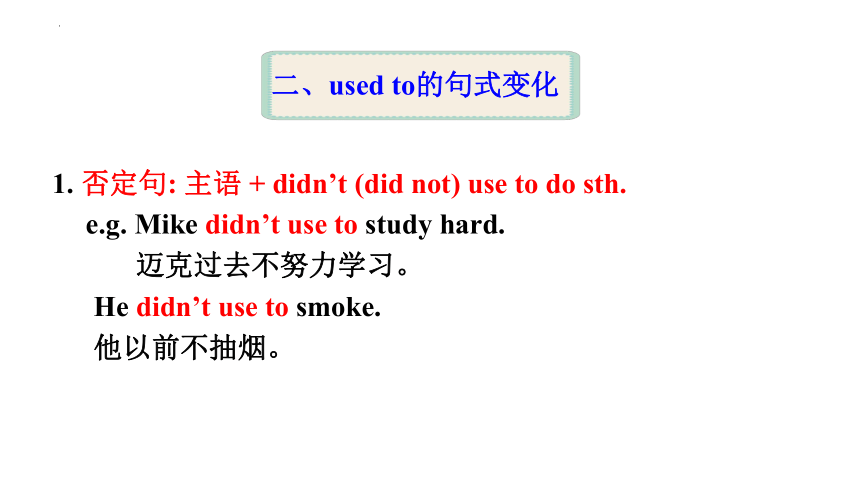
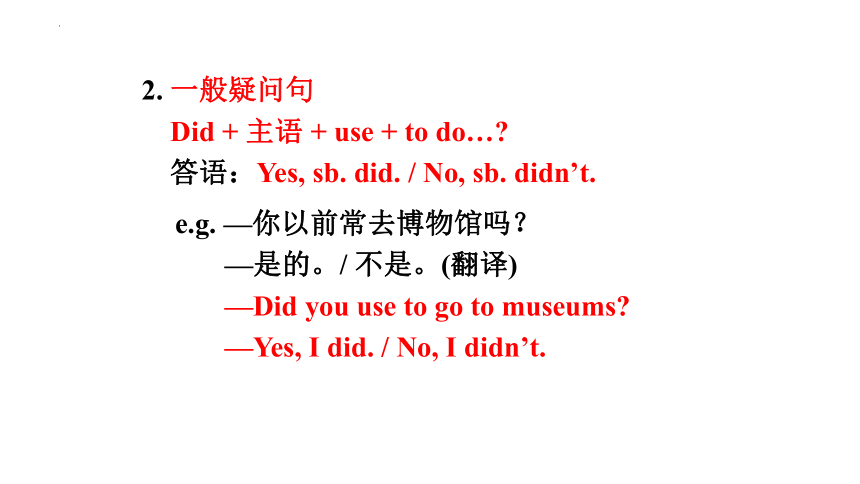
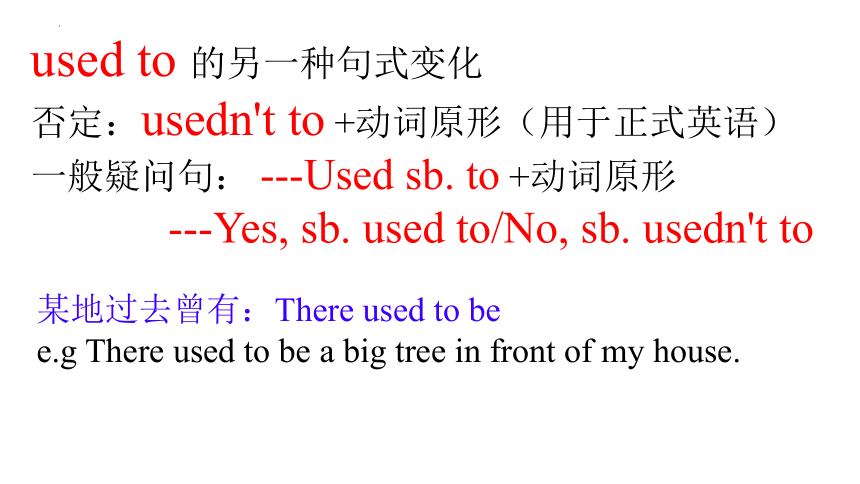
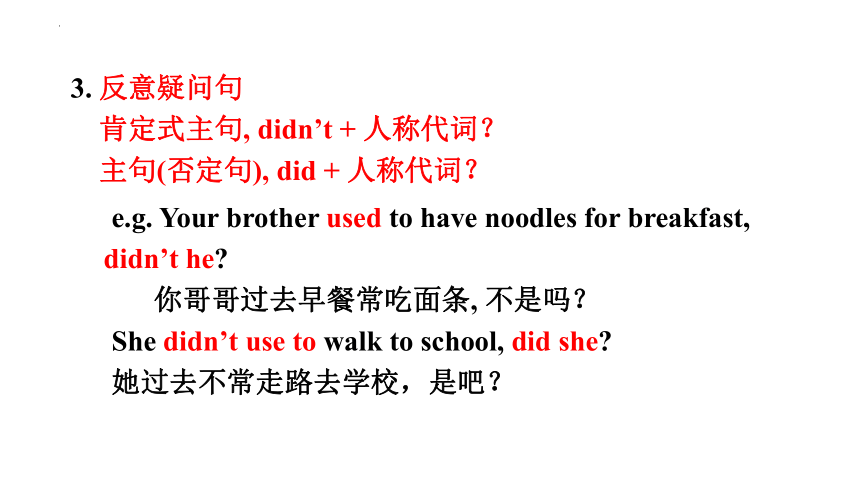
文档简介
(共22张PPT)
Unit 4 Section A (Grammar--4c)
To learn to use used to
Paula used to be really quiet.
I didn’t use to be popular in school.
—Did he use to wear glasses
—Yes, he did. / No, he didn’t.
—You used to be short, didn’t you
—Yes, I did. / No, I didn’t.
take up singing
deal with her shyness
dare to do sth.
not ... anymore
in front of crowds
all the time
get tons of attention
开始唱歌
克服她的羞怯
敢做某事
不再……
在众人面前
反复;一直
被众人所关注;吸引无数目光
Revision
worry about ... / be worried about ...
be careful about ...
hang out with friends
give up your normal life
fight on
require a lot of talent and hard work
make it to the top
the road to success
担心……;担忧……
对……小心
和朋友们闲逛
放弃你正常的生活
奋力坚持;继续战斗
需要很大的天赋和勤奋
成功
成功之路
used to 过去常常
1) 用于表示过去习惯性的动作或存在的状态, 强调与现在的对比, 暗示现在不做了。
2) to为不定式符号, 后跟动词原形。
3) used to只用于一般过去时态, 没有人称和数的变化。
一、used to的用法
e.g. We used to play the drums together.
Gina used to be a shy girl, but now she’s outgoing.
二、used to的句式变化
1. 否定句: 主语 + didn’t (did not) use to do sth.
e.g. Mike didn’t use to study hard.
迈克过去不努力学习。
He didn’t use to smoke.
他以前不抽烟。
2. 一般疑问句
Did + 主语 + use + to do…
答语:Yes, sb. did. / No, sb. didn’t.
e.g. —你以前常去博物馆吗?
—是的。/ 不是。(翻译)
—Did you use to go to museums
—Yes, I did. / No, I didn’t.
used to 的另一种句式变化
否定:usedn't to +动词原形(用于正式英语)
一般疑问句: ---Used sb. to +动词原形
---Yes, sb. used to/No, sb. usedn't to
某地过去曾有:There used to be
e.g There used to be a big tree in front of my house.
3. 反意疑问句
肯定式主句, didn’t + 人称代词?
主句(否定句), did + 人称代词?
e.g. Your brother used to have noodles for breakfast, didn’t he
你哥哥过去早餐常吃面条, 不是吗?
She didn’t use to walk to school, did she
她过去不常走路去学校,是吧?
【语境应用】 句型转换。
1) Grandma used to grow strawberries on her farm. (改为否定句)
Grandma ______ ______ ______ ______ strawberries on her farm.
2) You used to enjoy history. (改为否定句)
You ______ ______ ______ ______ history.
3) I used to collect tea sets. (改为一般疑问句)
______ ______ ______ ______ ______ tea sets
didn't use to grow
didn't use to enjoy
Did you use to collect
4) They used to play basketball at school. (改为一般疑问句)
______ ______ ______ ______ ______ basketball at school
5) She used to go to the beach on Sundays. (改为一般疑问句并作肯定及否定回答)
—______ ______ ______ ______ ______ to the beach on Sundays
—______, ______ ______.
—______, ______ ______.
Did they use to play
Did she use to go
Yes she did
No she didn't
词条 意思及用法 例句
used to do sth. 过去习惯性的动作或存在的状态 Did he use to wear glasses
use ... to do ... 用……做…… We use this knife to cut fruit.
be/get used to (doing) sth. 习惯于……, to是介词, 后接名词、代词或v.-ing My dad is/gets used to getting up early every day.
be used to do 被用来做……, 被动语态结构 This knife is used to cut fruit.
【语境应用】根据提示完成英语句子。
1) My uncle _________________ (以前是个司机), but now he is an actor.
2) Tom’s father __________________ (过去常常看书) after lunch.
3) Mary _________________ (以前常常骑自行车) to work, but now she _________________ (习惯步行) to work.
4) The pencil _______________ (被用来书写).
used to be a driver
used to read (books)
used to ride a bike
is used to walking
is used to write
1. Grace/watch a lot of TV/watch a lot of movies
____________________________________________
点拨:将第一个动作用肯定句来描述过去常进行的活动;将第二个动作用否定句来描述过去不常进行的活动。
Write sentences about the past using used to.
Grace used to watch a lot of TV. She didn’t use to watch a lot of movies.
2. my mom/have curly hair/have straight hair
_________________________________________________
_________________________________________________
3. Jerry/read books on European history/ read books on African culture
_________________________________________________
_________________________________________________
Jerry used to read books on European history. He didn’t use to read books on African culture.
My mom used to have curly hair. She didn’t use to have straight hair.
4. Sandy /teach British English / teach American English
_________________________________________________
_________________________________________________
Sandy used to teach British English. She didn’t use to teach American English.
Look at the information and write sentences about Emily.
e.g. Emily didn’t use to eat a lot of vegetables, but now she loves carrots and tomatoes.
2. Emily used to listen to pop music, but now she enjoys country music.
3. Emily used to watch scary movies, but now she hates them.
4. Emily didn’t use to read a lot of books, but now she reads at least six books a year.
Which of these things did you use to be afraid of Which ones are you still afraid of Check the boxes and then ask your partner.
---Did you use to be afraid of being alone
---No, I didn’t. But I used to be afraid of giving a speech in public.
Did you use to be afraid of flying
---No, I didn’t. But I used to be afraid of high places.
in public 公开地; 在别人(尤指生人)面前
“in + n.” 短语
in person 亲身;亲自
in surprise 惊讶地
in fact 其实;事实上
in silence 沉默;无声
in trouble 处于困境中
in danger 处于危险中
Are you better than you used to be
Change in good ways.
Make sure you 're trying to get better.
Summary
used to
肯定句
一般疑问句
否定句
sb.used to +
动词原形
sb.didn't use to+动词原形
Did sb. use
to+动词原形
Unit 4 Section A (Grammar--4c)
To learn to use used to
Paula used to be really quiet.
I didn’t use to be popular in school.
—Did he use to wear glasses
—Yes, he did. / No, he didn’t.
—You used to be short, didn’t you
—Yes, I did. / No, I didn’t.
take up singing
deal with her shyness
dare to do sth.
not ... anymore
in front of crowds
all the time
get tons of attention
开始唱歌
克服她的羞怯
敢做某事
不再……
在众人面前
反复;一直
被众人所关注;吸引无数目光
Revision
worry about ... / be worried about ...
be careful about ...
hang out with friends
give up your normal life
fight on
require a lot of talent and hard work
make it to the top
the road to success
担心……;担忧……
对……小心
和朋友们闲逛
放弃你正常的生活
奋力坚持;继续战斗
需要很大的天赋和勤奋
成功
成功之路
used to 过去常常
1) 用于表示过去习惯性的动作或存在的状态, 强调与现在的对比, 暗示现在不做了。
2) to为不定式符号, 后跟动词原形。
3) used to只用于一般过去时态, 没有人称和数的变化。
一、used to的用法
e.g. We used to play the drums together.
Gina used to be a shy girl, but now she’s outgoing.
二、used to的句式变化
1. 否定句: 主语 + didn’t (did not) use to do sth.
e.g. Mike didn’t use to study hard.
迈克过去不努力学习。
He didn’t use to smoke.
他以前不抽烟。
2. 一般疑问句
Did + 主语 + use + to do…
答语:Yes, sb. did. / No, sb. didn’t.
e.g. —你以前常去博物馆吗?
—是的。/ 不是。(翻译)
—Did you use to go to museums
—Yes, I did. / No, I didn’t.
used to 的另一种句式变化
否定:usedn't to +动词原形(用于正式英语)
一般疑问句: ---Used sb. to +动词原形
---Yes, sb. used to/No, sb. usedn't to
某地过去曾有:There used to be
e.g There used to be a big tree in front of my house.
3. 反意疑问句
肯定式主句, didn’t + 人称代词?
主句(否定句), did + 人称代词?
e.g. Your brother used to have noodles for breakfast, didn’t he
你哥哥过去早餐常吃面条, 不是吗?
She didn’t use to walk to school, did she
她过去不常走路去学校,是吧?
【语境应用】 句型转换。
1) Grandma used to grow strawberries on her farm. (改为否定句)
Grandma ______ ______ ______ ______ strawberries on her farm.
2) You used to enjoy history. (改为否定句)
You ______ ______ ______ ______ history.
3) I used to collect tea sets. (改为一般疑问句)
______ ______ ______ ______ ______ tea sets
didn't use to grow
didn't use to enjoy
Did you use to collect
4) They used to play basketball at school. (改为一般疑问句)
______ ______ ______ ______ ______ basketball at school
5) She used to go to the beach on Sundays. (改为一般疑问句并作肯定及否定回答)
—______ ______ ______ ______ ______ to the beach on Sundays
—______, ______ ______.
—______, ______ ______.
Did they use to play
Did she use to go
Yes she did
No she didn't
词条 意思及用法 例句
used to do sth. 过去习惯性的动作或存在的状态 Did he use to wear glasses
use ... to do ... 用……做…… We use this knife to cut fruit.
be/get used to (doing) sth. 习惯于……, to是介词, 后接名词、代词或v.-ing My dad is/gets used to getting up early every day.
be used to do 被用来做……, 被动语态结构 This knife is used to cut fruit.
【语境应用】根据提示完成英语句子。
1) My uncle _________________ (以前是个司机), but now he is an actor.
2) Tom’s father __________________ (过去常常看书) after lunch.
3) Mary _________________ (以前常常骑自行车) to work, but now she _________________ (习惯步行) to work.
4) The pencil _______________ (被用来书写).
used to be a driver
used to read (books)
used to ride a bike
is used to walking
is used to write
1. Grace/watch a lot of TV/watch a lot of movies
____________________________________________
点拨:将第一个动作用肯定句来描述过去常进行的活动;将第二个动作用否定句来描述过去不常进行的活动。
Write sentences about the past using used to.
Grace used to watch a lot of TV. She didn’t use to watch a lot of movies.
2. my mom/have curly hair/have straight hair
_________________________________________________
_________________________________________________
3. Jerry/read books on European history/ read books on African culture
_________________________________________________
_________________________________________________
Jerry used to read books on European history. He didn’t use to read books on African culture.
My mom used to have curly hair. She didn’t use to have straight hair.
4. Sandy /teach British English / teach American English
_________________________________________________
_________________________________________________
Sandy used to teach British English. She didn’t use to teach American English.
Look at the information and write sentences about Emily.
e.g. Emily didn’t use to eat a lot of vegetables, but now she loves carrots and tomatoes.
2. Emily used to listen to pop music, but now she enjoys country music.
3. Emily used to watch scary movies, but now she hates them.
4. Emily didn’t use to read a lot of books, but now she reads at least six books a year.
Which of these things did you use to be afraid of Which ones are you still afraid of Check the boxes and then ask your partner.
---Did you use to be afraid of being alone
---No, I didn’t. But I used to be afraid of giving a speech in public.
Did you use to be afraid of flying
---No, I didn’t. But I used to be afraid of high places.
in public 公开地; 在别人(尤指生人)面前
“in + n.” 短语
in person 亲身;亲自
in surprise 惊讶地
in fact 其实;事实上
in silence 沉默;无声
in trouble 处于困境中
in danger 处于危险中
Are you better than you used to be
Change in good ways.
Make sure you 're trying to get better.
Summary
used to
肯定句
一般疑问句
否定句
sb.used to +
动词原形
sb.didn't use to+动词原形
Did sb. use
to+动词原形
同课章节目录
- Unit 1 How can we become good learners.
- Section A
- Section B
- Unit 2 I think that mooncakes are delicious!
- Section A
- Section B
- Unit 3 Could you please tell me where the restroom
- Section A
- Section B
- Unit 4 I used to be afraid of the dark.
- Section A
- Section B
- Unit 5 What are the shirts made of?
- Section A
- Section B
- Review of Units 1-5
- Unit 6 When was it invented?
- Section A
- Section B
- Unit 7 Teenagers should be allowed to choose their
- Section A
- Section B
- Unit 8 It must belong to Carla.
- Section A
- Section B
- Unit 9 I like music that I can dance to.
- Section A
- Section B
- Unit 10 You're supposed to shake hands.
- Section A
- Section B
- Review of Units 6-10
- Unit 11 Sad movies make me cry.
- Section A
- Section B
- Unit 12 Life is full of the unexpected
- Section A
- Section B
- Unit 13 We're trying to save the earth!
- Section A
- Section B
- Unit 14 I remember meeting all of you in Grade 7.
- Section A
- Section B
- Review of Units 11-14
